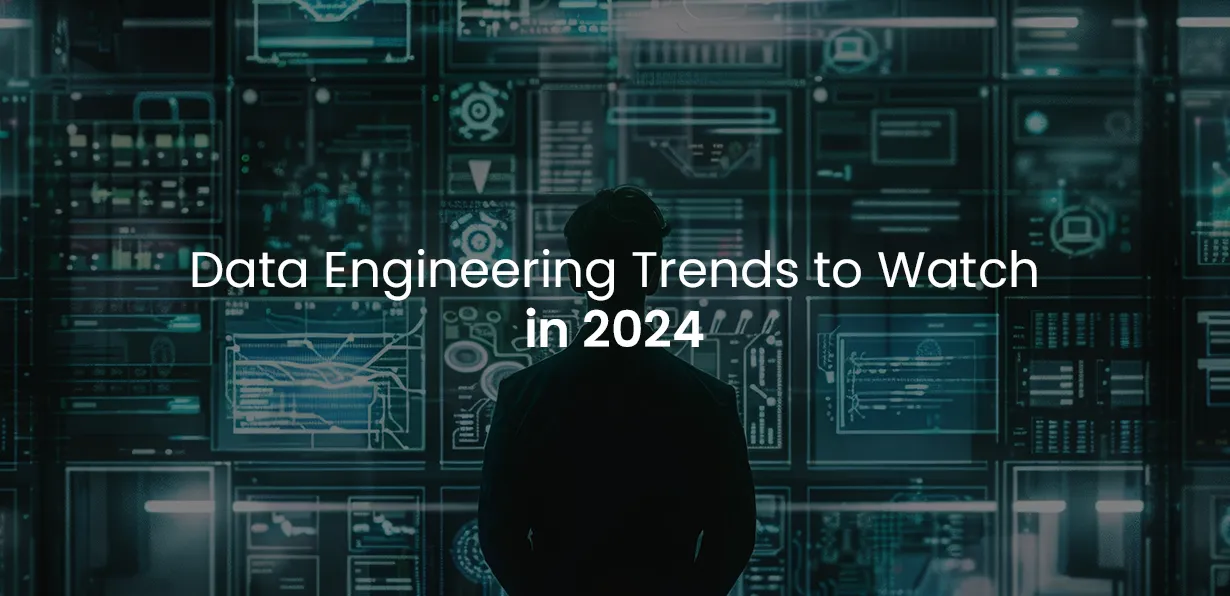Data Engineering Trends to Watch in 2024
The role of data engineering in the digital world continues to evolve. Data engineering involves dealing with creating and building systems that make the big data collecting, storing, and making the data useful for the analysis process easy. Here, the data engineer plays a vital role in managing, optimizing, and extracting data from the vast amount of data.
Therefore, data engineering is an essential part of business growth for businesses seeking innovative solutions. Extracting valuable data efficiently is vital, and that is where data engineering comes in. Looking ahead to 2024, several trends are set to reshape the landscape of data engineering.
Explore Some Key Developments:
Integration of Machine Learning with Data Engineering:
Both ML and AI are fast-growing concepts that are implemented in numerous industries’ business processes. Data engineers are becoming more involved with the actualization of ML models in data pipelines, passing data and preparing it for ingestion, performing intermediate processing, and feeding the processed data into models. Such tools as feature stores and ML Ops platforms are starting to be brought into play to address these issues, allowing data engineers, data scientists, and ML engineers to work more closely.
Focus on DataOps and Data Governance:
Therefore, with an increasing amount of data as well as increasing rigorous compliance standards and expectations, organizations are directing more attention to DataOps (Data Operations) and data governance. DataOps mainly focuses on interactions and operations during the process of data development, deployment, management, and monitoring. At the same time, sound business data management policies and standards assure data reliability, integrity, and compliance with legal and regulatory standards, curtailing risk factors related to data leakage and other compliance issues.
Evolution of Real-Time Data Processing
Especially with the influx of big data, the need for data analytics in real-time is becoming important. Applications like Apache Kafka and Apache Flink are still growing in the market. They continue to provide low-latency streaming solutions for data engineers who want to have real-time analytics. Therefore, the use of Azure Synapse in data engineering helps businesses manage intricate problems and gain valuable insights from their data in real-time.
Cloud-Based Data Engineering
Cloud based data engineering still is the vital data engineering trend to observe in the year 2024. It can be defined as a practice of architecting and executing data patterns in cloud environments. Also, Azure Databricks authorizes engineering teams with scalable data analytics and machine learning capabilities in the cloud. It is cost-effective and provides maximum security, increased scalability, and better flexibility.
Augmentation of Data Lakehouses
The relative concept of the data lakehouse has brought a fresh change in the increased demand and implementation of data lake technologies to support modern digital businesses.
Challenges such as budgets are hence contributing to more data lakehouses being appealing than cloud data warehouses. Lakehouse architectures are easy and cost-effective when it comes to storing data. The new Amazon S3 Express One Zone Storage Class, the flexibility of DuckDB, Polars’ ability to lazily process data frames, and increased adoption of Apache Iceberg and Kestra, which simplify event-driven orchestration, significantly improve the data processing over data residing in the lakehouse. Businesses can also adopt Azure Data Factory, which supports broader data transformation in Data Lakehouses.
Integration of Data Engineering and Machine Learning
Artificial intelligence and machine learning are becoming crucial parts of business planning. Data engineers are required to integrate machine learning models into data pipelines to provide smooth data flow from data input to model execution. New technologies that are being developed to simplify these procedures and enable communication between data scientists, ML engineers, and data engineers include feature stores and ML Ops platforms.
In a nutshell
This area of data engineering is dynamic, and it is highly influenced by technological advancement, business environment dynamics, and trends that affect the world. Thus, data engineers will be on the frontline in the year 2024 to safeguard these developments while incorporating innovative technologies that ensure the creation of a sustainable data framework. As a result, organizations are able to use adequate tools and methodologies and follow up with new trends to enable the use of data to deliver competitive advantages in the era of the digital ecosystem. Also, data engineering helps allow real-time analytics and decision-making in businesses, making instant responses to customer needs.
We at Nettfy Technologies empower the use of Azure data engineering and AWS dataengineering to help maintain your business’s successful future. So, partner with us and take your business to the top with our data engineering solutions.


